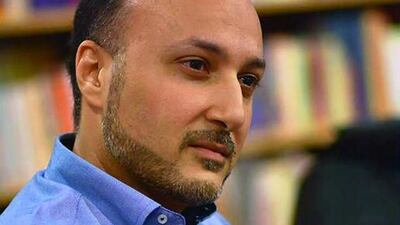In addition to honouring leading figures in contemporary Arabic literature, the Sheikh Zayed Book Award pays tribute to some of the emerging names from the region.
A harbinger of the talent to come is often the Young Author category which, since the award's inception in 2007, has shone a light on writers under the age of 40 who won for works ranging from novels to literary and political dissertations.
That said, the quality of entries has been waning of late and, as a result, the award has been suspended for the past three years.
The rut was broken this year by Ahmad Al Qarmalawi, who scooped the award, and the Dh750,000 prize-money, for his third novel Amtar Sayfiyyah (Summer Rains).
On winning the award
Perhaps in acknowledgement of the impasse, the Egyptian novelist said the win was deeply gratifying.
“There is no doubt the award is very important, not just because of the great person that is behind it, but also because, at the moment, there is not a wide and active readership in the Arab world,” he said. “So, at the very least, this award pays tribute to all the authors and acknowledges the hard work and sacrifice that went in to creating their work.”
Like the literature award winner Khalil Sweileh, who is a journalist, Al Qarmalawi is in full-time work as an architect in Cairo. He wrote his three novels at night when his family was asleep.
"It is a question about finding time," he says. "And that is a real struggle in a city like Cairo because so many things, from the personal to the professional, just eat away at your time. I have resorted to planning Amtar Sayfiyyah when I am driving or when I am struck in traffic jams."
Which kind of makes the work even more remarkable in that the novel, which although is set in present day Egypt, is far removed from the hustle and bustle of city life.
Amtar Sayfiyyah is a rather genteel and deeply poetic work that intersects the modern and mystical worlds.
A musical story
The story centres on a music conservatory specialising in the oud. However, what sets the facility apart is that it was opened centuries earlier by a Sufi sheikh with the aim of creating music that lifts the spirit.
The plot picks up when Sheikh Dhaker, the manager of the conservatory, chooses Yousif to be the latest “guide” in the facility. It is a position that entails not only teaching the technical aspects of the instrument, but to perform it in a way that spiritually inspires the listener.
This is a subject that Al Qarmalawi is familiar with. An avid oud player, he recalls teaching himself the instrument when he first came across it as a 12-year-old.
“I was living in Kuwait at the time and there weren’t any music schools around,” Al Qarmalawi says.
“So I basically taught myself for the next seven years and learned by ear and by my mistakes. I became obsessed by the oud and its shape and how it smelled. I viewed it as basically an extension of myself.”
The infatuation with the instrument is discussed in the novel, in addition to meditations on creating art for a purpose higher than material gains.
“I was trying to explore these two themes of music and spirituality,” he says.
“The aim was to try to blend these two together to tell a story. It’s that attempt to bring two worlds together that I think makes good literature.”
_____________________
Read more:
Jordanian author wins 'Arabic Booker'
‘Frankenstein In Baghdad' to be released in English: we speak to Ahmed Saadawi
Ahmed Khaled Towfik: the pioneer of Arabic Sci-fi
'Our Time Has Come ' is a lucid and compelling account of India under Modi
_____________________
While Al Qarmalawi is renowned in his homeland, he credits the Sheikh Zayed Book Award for exposure to the wider Arab world. However, more than the personal acclaim, he hopes his rising profile will inspire more young Arab writers to tell their stories.
On that front, he believes there is a newfound vitality within the new generation of novelists and he doesn’t expect the Sheikh Zayed Book Award to be short of worthy candidates at any time.
“I do sense there is a new energy in the scene,” he says. “Part of that is also down to the young Kuwaiti author Saud Alsanousi winning the International Prize for Arabic Fiction in 2013, that inspired a lot of us, and I expect some great work to be released as we go ahead.”


